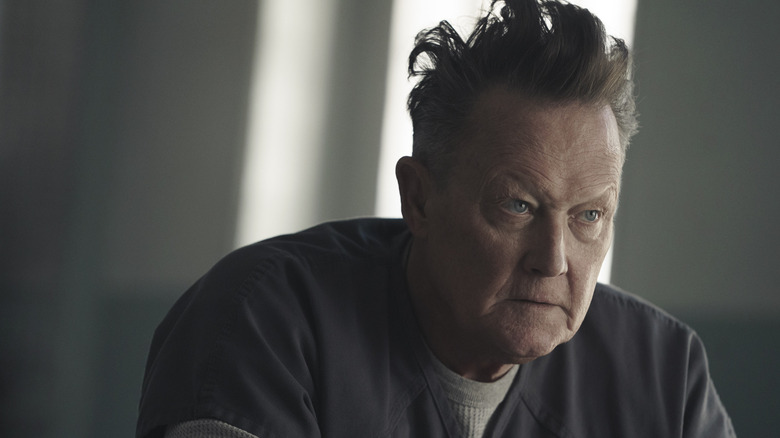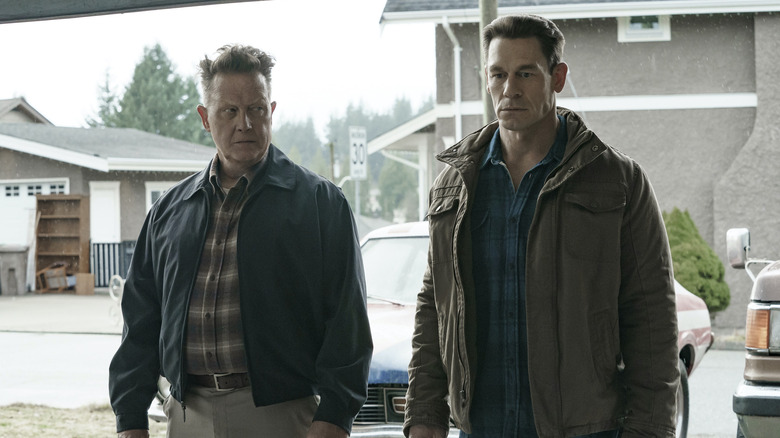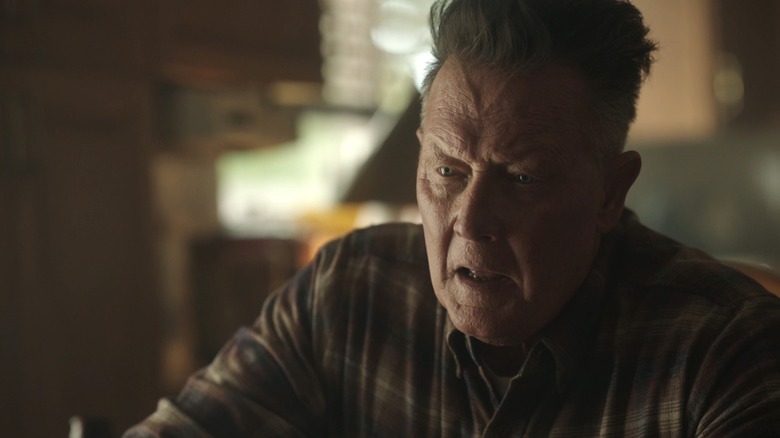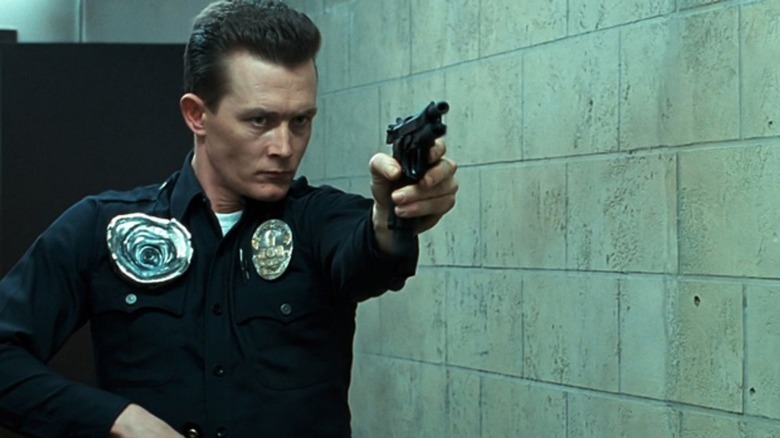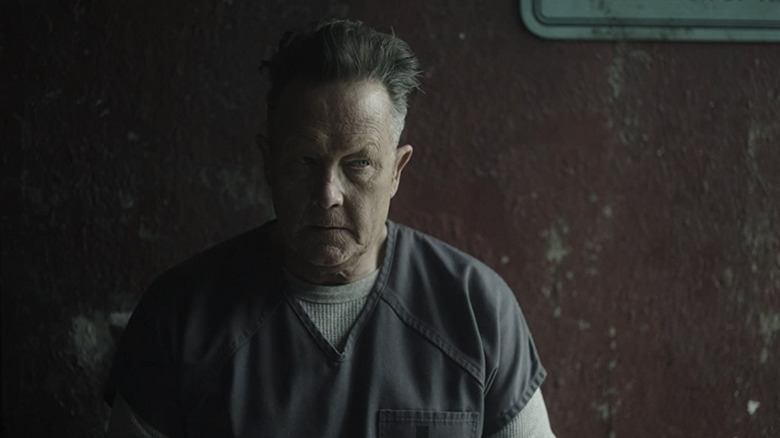Peacemaker Star Robert Patrick On Playing A Horrible Human Being [Interview]
"God bless you."
You know, when Robert Patrick says "God bless you," it feels pretty damn good. The actor couldn't be more unsettling in "Peacemaker," playing the titular character's horrifying father, Auggie Smith (AKA The White Dragon). But during a recent interview about James Gunn's HBO Max show, he was a well-spoken delight.
Patrick portrays pure evil in the show, which is the story of a bad guy facing off against someone even worse. For the actor, the gulf between his real-life personality and the vile character he's playing actually made it easier to tap into the role — and he's clearly a fan of the final product. "HBO Max and the producers, Peter Saffron and Matt Miller, I think they really let James do James Gunn," he said. "When you're just allowing a guy to be free and do what he's going to do, great things happen." Patrick recently told us about his experience with Gunn, playing Auggie Smith, and his support and involvement in Rolling to Remember.
"This guy's just f***ing horrible."
Note: This interview has been edited for clarity and structure.
In "Peacemaker," you play a terrifying villain.
Yeah, what is it about him you don't like?
Everything.
He's a horrible father. A misogynist. Xenophobe. Antisemite. Complete out and out racist, white nationalist. Deep state thinker. Believes the country's under attack. Yeah, he's a pretty despicable guy.
I think James and you do a very good job with tone. The fact that he made this show as fun as it is, but still depicting that ugly side of people without softening those edges with humor, I just thought that was very well done.
That was such an articulate statement, that should be the review. You nailed it exactly. And that's what's provocative about it, that's why it's so fascinating to be involved with it. To be involved with DC Comics, to be involved with James Gunn. I think he's got a wonderful talent, one of the most creative minds out there, and I jumped at the chance, because of the way he handles it. Just the way you worded it. Because it's relevant, but it's funny and you can take the piss out of a moment. It's horrible, but we can laugh. That's a fine edge. This is Archie Bunker on steroids. This guy's just f***ing horrible.
Is that how James pitched the character to you immediately? "This guy's just horrible?"
No, I think that's how I interpreted it. I can take it back to the moment when James Gunn called me up on a Zoom meeting like this, we had a conversation, he said, "Hey, I was watching 'Perry Mason,' your character on 'Perry Mason' became what I imagined Auggie Smith, and I couldn't think of anybody else, so I wanted you to play this part."
I didn't even read the scripts, this is how willing I was, Jack, to get in there. So, just based on his enthusiasm and what he told me, he told me, "You're a horrible father. You have to be extremely horrible because Peacemaker's such a horrible guy. You have to be worse. You're just disgusting. You're repugnant." That's juicy. Who doesn't want to play that part?
"Of all the moves I've seen in my life, that might be that might be the coolest – and definitely the classiest – thing I've ever seen."
I read you say sometimes a character like this is oddly easier to play.
Yeah, yeah.
Why is that?
Yeah, I don't know, but it's true. Character acting and finding a character is what we do, and sometimes if you don't play a character that's so clearly defined as this, and you have to find shade, it's a little harder to find nuance and color that you want to give the character — the tone as it were. My good friend, Hal Holbrook, God rest his soul, said he had a harder time playing closer to himself, being himself, than playing Mark Twain because Mark Twain is the character that he embodied and played in his one-night shows and whatnot. He could hide behind the makeup and all this kind of stuff, and that's the truth. When you're playing something a little closer to you, it is harder. When you're playing something farther away from you, thank God in my case a racist, xenophobe, misogynist, that's about as far removed from me as you can get, and so it's easier to grab. I know that doesn't logically make sense, [but] it's the reality.
Those performances without bells and whistles, no prosthetics or major transformations, are usually the best but don't always get the most accolades.
Absolutely. Absolutely, because it's the inner workings and those are the things that are happening around behind the eyes. As an actor, you've got to be aware of your craft, you've got to be aware of your vessel, and you've got to know camera techniques and how do you power what's going on behind your eyes out to the world of what you're thinking. This is the wonderful part of acting, is how to convey those non-verbally communicated signals of who and what you are.
So, say on "Peacemaker," what were some of those choices you were making based on what James was doing with the camera?
Well, James directed it with a microphone, so we would do the text. I'm aware of the camera, I love the camera. I learned that early on from Jimmy Gardner, love that camera, and don't be afraid of that camera, welcome that camera into me, and so I love it. I love it when the camera's on me, and I don't get too self-conscious about it because I enjoy it. It's part of the process. I want to communicate through that camera to you, but I don't get too caught up in it. That's the sleight of hand you get after doing this for almost 40 years. That's a great majority of my life lived on the other side of the camera, and so it becomes like a second hand. It's a subconscious kind of a thing that you're aware of.
He directs you, and all of a sudden you'll be done with the scene, but the scene's still rolling and he'll talk to you loudly through the PA system, and usually invariably he's got a very funny line. You got to hang in the moment, get yourself back into that moment, that's your job. You do that, but you'll do that line, and it's hilarious. I love James. I'll just come right out and say it, I love the guy. He's just fantastic. I think he's a great human being, and I'm just super thrilled that he saw me in "Perry Mason" and asked me to do "Peacemaker."
Good show, by the way. I really enjoyed "Perry Mason.
Yeah, I loved "Perry Mason." I wish I was back there this season, but obviously, they got a new antagonist.
How far do you and John Cena go back? Around 20 years now?
I'm trying to think back on how long I've known John, but John's a great guy. We met on "The Marine," and it was his first film, and he had a lot of questions, very approachable. John and I had a great time working together, let's just say that. It wasn't totally the best work experience for me or him for unspecified reasons, but as far as he and I and our relationship during that time period, we were fine. We got along good.
I did work with him again on "Psych," and when I worked with him on "Psych," I said, "Hey John, my son is a big wrestling fan. He's a huge fan of yours." My son was probably about 10 years old and he's 21 now, and I said, "I'd love it if I could come down and see you in one of these events when you're in L.A." And he said, "Sure," invited me down to Summer Slam or something.
John, a very observant, very aware guy, he clued in on where I was sitting before he ran out, and when they announced him he ran out, and he took the ring, and he slid across the ring. He slid all the way out the other side of the ring, took off his You Can't See Me hat, put it on my son's head, got back in the ring and started wrestling. I thought, "Of all the moves I've seen in my life, that might be that might be the coolest — and definitely the classiest — thing I've ever seen."
"I think that's why it holds up so well today."
How much did you and John talk about the history of the father-son relationship, or was it all in the writing?
Well, really it's a combination of both. James writes so well. Early on, you pick up what's going on. The signals are there, the signs are there. When John first saw me, we talked, I remember seeing he was shooting that scene where he is in his hospital gown on the first day, and I came to set to show James the hair I wanted to do. I wanted to do this hair going up like this, because the White Dragon costume goes up into two horns and I just wanted to kind of get that thing going. He was looking at my hair and everything, and then I was walking off, and [producer] Lars Winther, who's a good friend of mine, and he said, "Hey, you want to say hey to the big guy?" I said, "Yeah!"
I walked in, I saw John, and he's standing there in his hospital gown, and I said, "Hey man, how you doing? How's your arm?" Because I had hit him in his left elbow when we did "The Marine," the fight scene. He says, "Good. It's good." He was laughing, he knew what I was talking about. Because I felt terrible about that. I hit him with a pipe, and I remember when I hit him it was just awful. I could see it on his face like he was ready to kill me. But, we talked for a little bit. He was trying to shoot a scene and I was trying to say hello, and we talked a little bit. He was going, "Well, yeah, we got a lot of time to talk about things." And I said, "Yeah, yeah, yeah," so I left him to shoot the scene because he wanted to shoot.
We did not get into too much backstory. I felt and feel, and I bet he would back me up on this, I feel like there's a chemistry we have and it must be because we have known each other for this amount of time and have interacted over the 15 years. Not like we're best buddies or anything, but we know each other. We have a mutual respect for each other. I am a big admirer of John Cena, what he's accomplished in his lifetime. Early on when we were doing "The Marine," I had said to him, "You should be the next Terminator," and he remembered.
He remembered that, and I was very serious about it. I was like, "Dude, you would be so f**king perfect to be the next Terminator." And that could still happen for him. My admiration and respect for him is very intact. He's the leader, he's number one. He's a great guy. Everybody follows his example, he leads us into battle each episode, and his work ethic is just incredible. You have to admire that, and what he's done in his personal life as well. He's an accomplisher. He accomplishes new endeavors. He learns how to play a piano, does this, picks an instrument, does this, learns a language, does this. I think the guy knows seven languages. It's very admirable. He's an achiever.
Very admirable. With "Terminator 2: Judgment Day," it was so groundbreaking in visual effects. It laid the groundwork for a lot of these superhero films and shows. When you were working on that, did you have any idea it would lead to what we're seeing today?
Well, I knew that James Cameron was a brilliant man. I think James Gun is a brilliant man, and I think James Cameron is a brilliant man. I think they're in that class with the Elon Musks of the world in their prospective fields and where they lend their talents — I think they're groundbreaking artists.
I think that I am such a luddite, and I have a hard time with an iPhone, a computer and all this kind of stuff — God bless my wife, if she wasn't able to help me out with all the stuff that I do, I don't think I'd be able to do it — but as far as the effects and everything, when I read "Terminator 2," I read that script, it took me five hours to read it. I couldn't comprehend what the f**k was going on. I was like, "Jesus Christ, what? What the f**k?"
James Cameron was pushing the envelope. He knew exactly what he could do, what was available, and what would possibly be able to work if he pushed Steve "Spaz" Williams, Mark Dippé, Dennis Muran, and Industrial Light and Magic, if he pushed them to go to the next level with that liquid CGI element he had used in "The Abyss," as far as applying that to the liquid metal "Terminator." And he used it and overlapped it with the practical effects of Stan Winston and all the animatronic puppetry he has and designed and made for my character, and it's layered with physical stunts, my physical presence, and all that wrapped together is the effect of the movie.
That's what's so great about that character. It's like four parts: mine, Cameron, ILM, and Stan Winston. There are four elements, and my job was basically to figure out a way to tie it together, hold it together, keep it together, and continue moving the character forward. I was the face of the character, you know what I mean? I think that's why it holds up so well today.
"I think it's a good way to put everything in perspective for you"
Have you done any cross country trips on your bike lately?
Yes, I just did two. Last year I went 30 days on the road doing personal appearances all across America, and I went all the way up into Wisconsin, Milwaukee, through Chicago to Cleveland, and all the way across to Boston. This was not for Rolling to Remember, though, these were personal appearances. I was out there for 30 days with my friend, New York Mike. That's a lot of riding, brother.
How has all that traveling shaped your perception of the country?
America's a beautiful country, and there's a lot of space out there. It's wide open. I think it's something that anybody and everybody, I think if they have an opportunity to get out and expand their horizons and see America, it'd give them a different point of view. We're all densely populated in these cities, and when you break out there and you go into the Wild West and in the middle of America and there's nothing there, it's very inspirational. You realize how insignificant we are and how powerful nature is. You have to also give us accolades for being able to harness the environment and make it much more livable for us as a species because without food, shelter, and all those things, life is harsh.
I think it's a good way to put everything in perspective for you, beyond the political ramifications of what peoples' views are as you're going across the country. Not everybody lives in a big city and they have different concerns, and that's why we must always have the electoral college. We have to make sure everybody is represented in Washington, and that's why Washington is such a significant place. That's why Rolling Thunder and Rolling to Remember, that's why we go there to demonstrate. That's where you go to make sure your voices are heard. Rolling Thunder was always a demonstration, and Rolling to Remember is a demonstration for veterans' rights.
As someone from DC, it was always powerful to see.
Jack, the fact that Rolling Thunder happened organically because our boys from Vietnam were treated so harshly by their own government, by their own people that they put their life on the line for, and were so mistreated on their return from Vietnam, they started demonstrating saying, "Hey, we got guys back there that are Missing In Action and POWs." That's what started Rolling Thunder. That's why the demonstration started, because there were Prisoners of War left behind back there. Artie Muller, and New York Mike, and a bunch of combat veterans from Vietnam, they went down there, they rode their Harleys down there, and that's how it all started.
It wasn't an organized thing. It was, "We're going to go down there and make sure you hear us on Memorial Day. We're pissed off. Where's our Memorial?" And then when they got the Memorial they got, they didn't like it. "Why is our Memorial underground? Why are you hiding us? Where's our American flag? Why aren't you proud of us?" All those questions they had, that's what drove that movement. It's interesting that they felt that Harley Davidson was the best way to demonstrate, and make sure that they were heard with those loud pipes echoing off the canyons of Washington D.C. Hey, we're here.
Through their efforts they found out that there were POW and MIA from all the wars before that no one had ever known about. They actually discovered that there were 84,000, maybe even more, POW and MIA from all wars. It started a whole movement, and the whole POW MIA Movement, National POW MIA Recognition Day, and trying to find closure. They hate that term, but trying to find out what happened to these guys and gals, and bringing them back for their families has been their main issue.
But now, Rolling to Remember is also to not only remember that, but veterans issues as we go forward, which is a very big deal. We live in a time, you got to think about it, one percent of the population is willing to go to war. One percent. Now, you can't mishandle that. The blood and treasure of our country is to be used in defense of our country, and you don't want to start becoming the policeman of the world and the defenders of the world and all the problems in the world. We want to take care of ourselves, and that's why we're all a little concerned about what's going on with Ukraine right now.
I've been to Ukraine, and I've filmed in Ukraine, and met some wonderful people in Ukraine, and I'm concerned about it. I'm concerned about what's going on there with Putin, with the build-up.
"Peacemaker" is now playing on HBO Max.
